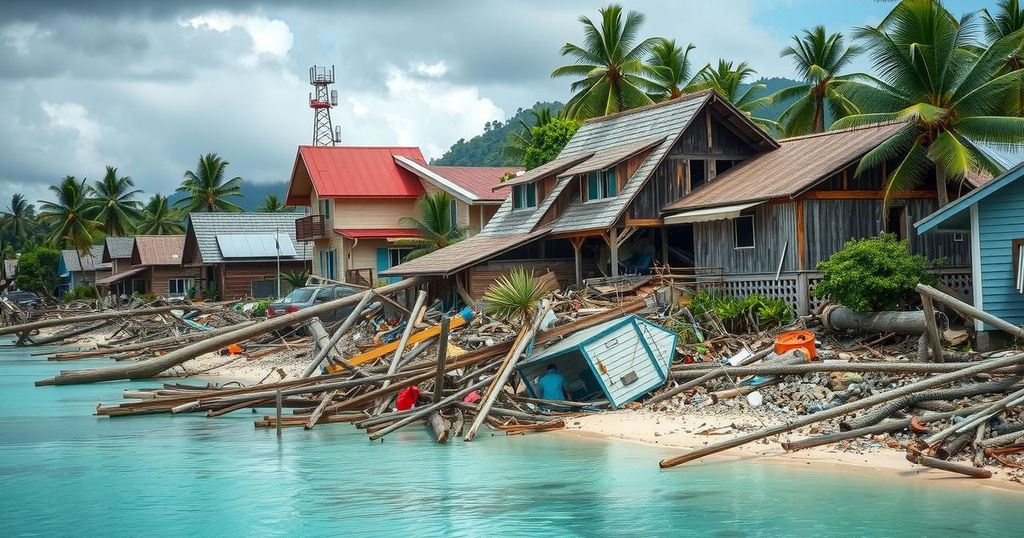Natural Disasters Strike Southeastern Africa and Vanuatu: Cyclone Chido and Earthquake Impact Health and Communities
Tropical Cyclone Chido severely impacted Mayotte, Comoros, and Mozambique, with devastating consequences and loss of life, followed by a 7.3-magnitude earthquake in Vanuatu. Direct Relief is actively providing emergency medical assistance in these regions, addressing immediate healthcare needs while highlighting the long-term health risks such disasters can pose, including disease outbreaks and disruption of chronic health services.
Last weekend, Tropical Cyclone Chido ravaged the Mayotte archipelago, Comoros, and Mozambique, leading to widespread devastation and significant loss of life. Shortly after, Vanuatu experienced a 7.3-magnitude earthquake, compounding the crisis for already vulnerable communities. Cyclone Chido was the most powerful storm to affect Mayotte in over nine decades, unleashing wind speeds surpassing 140 miles per hour and generating storm surges up to 28 feet, which decimated entire neighborhoods, particularly informal settlements accommodating undocumented migrants. The confirmed death toll in Mayotte is 22, although estimates may rise significantly as assessments are conducted.
In Comoros, the cyclone similarly wreaked havoc, prompting President Azali Assoumani to declare a week of mourning and recognize the “enormous” damage sustained by the country’s infrastructure. Mozambique, already prone to severe climatic events, faced the full impact of Cyclone Chido with winds exceeding 160 miles per hour and torrential rainfall disrupting homes and essential services.
Direct Relief has mobilized efforts to assess and fulfill the needs of affected populations. In Mayotte, the organization has engaged with French emergency agencies to facilitate immediate healthcare support. Efforts in Comoros involve collaboration with Santé Diabète, a French non-governmental organization focused on diabetes care, to provide necessary relief. Furthermore, communication with Mozambique’s Ministry of Health is ongoing, focusing on providing emergency medical supplies as damage assessments progress.
Simultaneously, Vanuatu is coping with the aftermath of a powerful earthquake that struck with a magnitude of 7.3. Initial reports indicate extensive damage to residences and healthcare infrastructure, with aftershocks continuing to pose threats. Direct Relief has commenced coordination with local healthcare partners to identify critical needs and is sending emergency medications and medical supplies this week.
Natural disasters such as earthquakes and cyclones pose immediate as well as long-term risks to public health. They often lead to mass casualties, trauma, and infrastructural collapse that can overwhelm local health systems. Following such events, communities become susceptible to disease outbreaks due to contaminated water sources; an increase in displacement leads to overcrowded shelters where sanitation is compromised, hence elevating the risk of communicable diseases. Moreover, chronic health care for conditions like diabetes becomes difficult, jeopardizing the well-being of vulnerable populations, including pregnant women and infants.
Direct Relief strives to confront these diverse challenges by ensuring that essential medical supplies reach frontline healthcare providers during crises. The organization has a distinguished history of responding to some of the most devastating disasters worldwide, including Cyclone Idai in 2019 and the catastrophic earthquakes in Türkiye and Syria earlier this year. In Vanuatu, Direct Relief has a long-standing commitment, consistently delivering emergency medical supplies after cyclones and earthquakes.
The organization is also dedicated to preparedness initiatives, pre-positioning medical resources in high-risk zones ahead of cyclone seasons to ensure timely assistance in emergencies. With ongoing support and commitment, Direct Relief continues to provide vital healthcare resources to disaster-affected communities, aiming to facilitate recovery and ensure access to essential medical care during and after such events.
Recently, the southeastern coast of Africa faced a series of natural disasters, most notably Tropical Cyclone Chido and a significant earthquake in Vanuatu. These disasters have substantial impacts on public health, infrastructure, and local economies. Cyclone Chido was particularly devastating, characterized by extreme wind speeds and flooding, affecting vulnerable populations in regions that often lack robust emergency response mechanisms. In tandem, the earthquake in Vanuatu highlighted the susceptibility of island nations to seismic activity and its severe consequences for healthcare systems and community resilience. Assessing and addressing the needs of affected populations is crucial for effective disaster response, and organizations like Direct Relief play a vital role in delivering aid and supporting healthcare infrastructure.
The recent calamities of Cyclone Chido and the Vanuatu earthquake underscore the urgent need for effective disaster response and recovery efforts. These events not only result in immediate casualties but also pose long-term health risks due to disease outbreaks, displacement, and disruption of chronic health care. Organizations such as Direct Relief are pivotal in providing emergency medical supplies and aid to affected areas, enabling timely healthcare delivery to vulnerable communities. Their ongoing commitment to disaster preparedness and response ensures resilience and recovery for those impacted by natural disasters.
Original Source: www.directrelief.org




Post Comment